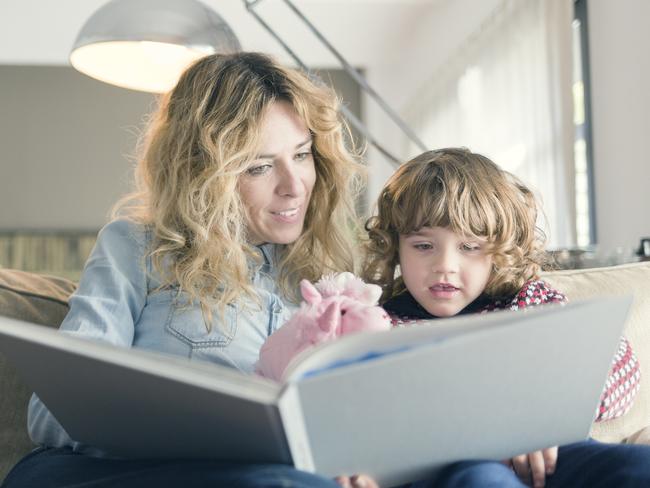Lack of reading linked to hyperactivity in kids
Failing to read to your children throughout childhood could lead to a higher chance of them developing hyperactivity-inattention, a shocking new study by Australian researchers has found.
Exclusive: Failing to read to your children and do things to improve their vocabulary throughout childhood and early adolescence could lead to a higher chance of developing hyperactivity-inattention, a new study by Australian researchers have found.
The groundbreaking research has for the first time conclusively showed educational emphasis should not just be on kids who enter school with low language skills, but also those who are dropping behind their peers in the first few years of primary school.
The Deakin School of Psychology analysed data from almost 5000 Australian children and found lower growth in vocabulary over primary school was associated with increased hyperactivity-inattention at eight to nine years and more rapid increases in hyperactivity-inattention over early to middle teenage years, up to 14 to 15 years.

Children as part of the analysis were assessed six times between four and 15 years of age.
“These findings show the importance of monitoring children through middle childhood and adolescence as they develop,” lead researcher Dr Elizabeth Westrupp told News Corp.
Prior research had only looked at children at one point in time.
“We know that children’s language ability and mental health are not static, they change as children grow,” she said.
Strong emphasis on improving literacy as children progress through primary school was vital.
“There is some explicit language teaching in the first years of formal schooling, but there’s much less focus in older years. So a continued emphasis on these skills would help us to best support children to thrive,” Dr Westrupp said.
One in five Australian children are not meeting international benchmarks for reading, according to the Progress in International Reading Literacy Study released in 2017 and one quarter of Year 4 students did not meet the intermediate or minimum standards according to the same study.
MORE: Push for more kids’ books for diverse families
MORE: Finally, a genderless book for all families

A News Corp survey of 1000 participants this month found 85 per cent of parents want their kids to spend more time reading but 70 per cent admit it’s easier to put their kids in front of a screen.
Executive director of The Parenthood Alys Gagnon said the research was fantastic and would really help drive the message home to parents about how important reading was for kids of all ages.
“We need more investment in education across the board,” Ms Gagnon said.
She also said it highlighted the need for more flexible working arrangements for parents.
“Parents need flexible working arrangements to allow them to have quality time with children to help them read and develop language skills and develop a lifelong love of reading.”

Early childhood expert Megan O’Connell from Melbourne University said getting literacy skills right from a very early age was paramount.
“We still really need to be focusing our efforts on the 0-5-year-old space because we know that if you get that right it sets kids up for a lifetime,” she said.
Education Minister Dan Tehan said reading and writing was paramount to success for Australian children.
“Our education system must ensure that every child gets the basics right,” he said.
“The Morrison Government is improving the literacy and numeracy standards of teachers by requiring graduate teachers are in the top 30 per cent of the adult population for literacy and numeracy.”
Opposition education spokesman Tanya Plibersek said it was important parents read with their kids for a myriad of reasons.
“There’s no doubt reading to your kids has lifelong benefits. Squeezing some reading time into busy family lives is not just good for kids but a relaxing thing for the whole family,” she said.
TIPS FOR LANGUAGE DEVELOPMENT
• Talk more: Children learn through conversations with you — so the more you talk the better. Talk about what you’re doing and the topics that matter to them.
• Read more: Read with your child, and then start a conversation about what you’re reading.
• Talk to the school: Don’t be shy in talking to your child’s schoolteacher about how your child is developing in relation to their peers.


